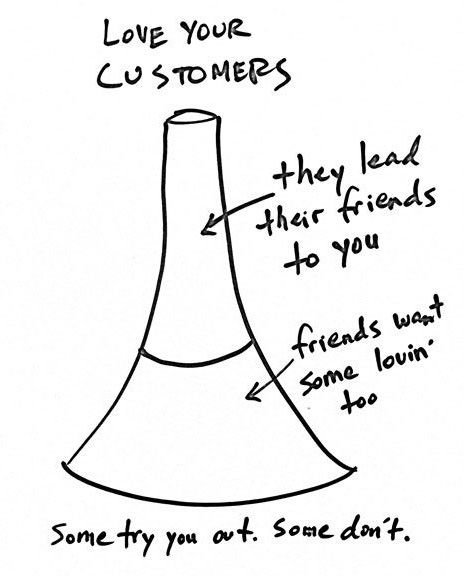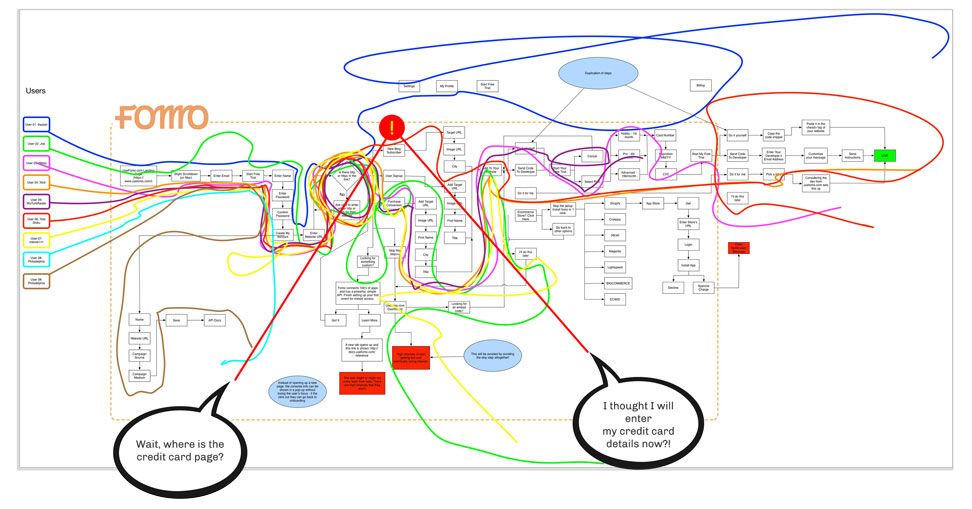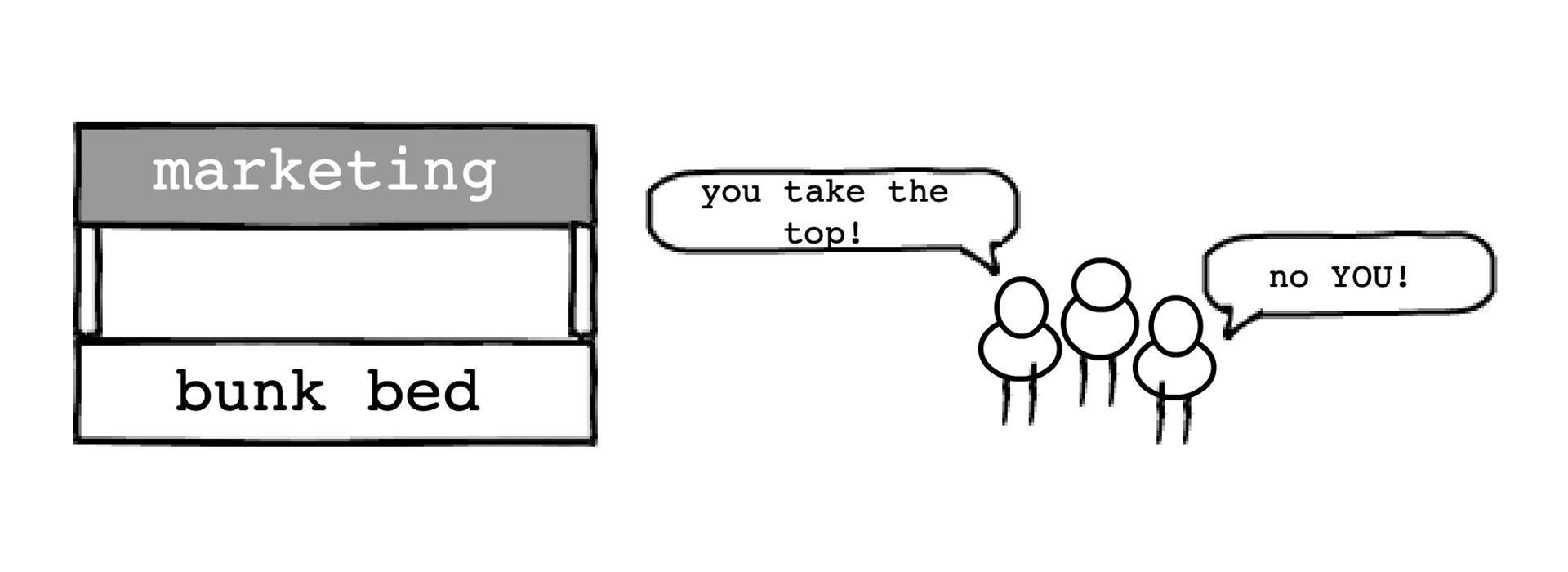Your Team is a Marketing Funnel
sales teams salivate over the funnel:
- top - leads
- middle - prospects
- bottom - customers
if you're a marketer you might subscribe to the AARRR framework coined by creepy #MeToo'd venture capitalist Dave McClure.
here's that acronym, which is also my format for monthly shareholder updates:
- Acquisition - signups
- Activation - onboarding
- Retention - not cancelling
- Revenue - up-selling or cross selling
- Referral - telling people (who start over at the top, Acquisition)
both visualizations are useful.
even content marketers have a "write content for each stage of the funnel" heuristic and perhaps most famously is Ben Chestnut's "flip the funnel" mantra.

we subscribe to this approach at Fomo.
eight of us build what our customers want and they tell others "the Fomo dudes built us what we want!"
Funnel 101 covered, let's move on to reality.
marketers are 1 trick ponies
being a mediocre marketer means having great ideas you can't execute.
sometimes it's a grand scheme like "if we built a free app that does X, we could convert Y% of them to our Main Offering."
but more often and tragically it's something technically trivial like "if we could just email people who click X after Y happens we would increase ______."
there are a couple ways to remedy this:
- hire developers who care about business goals
- teach marketers to code
while either strategy works, they miss the big picture: your company is the funnel.
here's what that looks like, and why marketers are frustrated.
organizational marketing
top of funnel - marketing
the marketer's job in a purist sense is lead generation: tell the right people how you can help them, and for how much.
marketers today do a lot more than this (which is awesome) but it comes at a cost. you'll see why below.
middle of funnel - support
we all dream of "evergreen funnels" with 100% self-service onboarding that's bug-free and not confusing to customers [at-all, no-way, not even the noobs].
Fomo thought we accomplished this until Darvinder interviewed new users and drew a map of their onboarding behaviors:

this was an eye-opening experience that reminded us how important high-touch support is to scaling software. yes, it takes people to scale code, not just servers.
our 2019 annual goals articulate as such: support, marketing, and engineering are the 3 departments of every tech company.
bottom of funnel - engineering
a lot of developers prefer to "not be bothered" by business goals. they reason "i write the code, and you don't know how" so that must be good enough.
unfortunately for them, code is just a tool.
a tool by which the marketer scales the promise, but code is not the promise.
in other words, all those marketing ideas requiring developer assistance are actually the developer's job.
they just don't want to do it, and marketers who can't hack it are left frustrated.
what a business really is
if you're a socialist, take a deep breath:
a profitable company is a money-making machine.
machines have an open valve (top of funnel), black box (middle), and delivery mechanism (bottom).
for every "widget" (sale) produced it needs oil, maintenance, operation. marketing is the oil, support teams maintain, and developers operate the heavy components.
too much marketing, support, or engineering makes the machine malfunction, and most startups are run with too much of one of these resources.
applying these fundamentals to our business at Fomo is how i realized...
marketing is a part-time role
we *tried* giving full-time attention to marketing and sales. we tried it for 3 years.
2016 - hired our first marketer (besides myself) – too much hype
2017 - hired 4 marketers to run ads, build landers, send email – off brand
2018 - hired a marketer to grow partnerships, create content – no traction acceleration
2018 - hired a director to sell big deals – fell behind on product
in total 7 people have worked at Fomo as marketers and i let go of all of them. because marketing is a part-time job.
(or i suck at new hire onboarding, but having trained dozens of people in marketing, sales, guitar, etc with success makes the evidence contradictory...)
your company is the funnel
this method, treating skill departments like components in your money-making machine, cannot be overstated.
right now at Fomo, for example, we're working on activation and retention (middle of funnel). let's recap our Top and Bottom of funnel so you understand why:
top
daily signups are 90%+ organic or word of mouth.
no matter how much content we create or how much we spend on ads or how many podcasts i curse on or which events we exhibit or even what pizza parties we sponsor, our [average] daily signups is the same.
bottom
annual upgrades, case studies, and private beta releases have increasingly predictable ROI. being a Fomo customer is also easier + more valuable the longer one sticks around.
because we're working on the Middle i staffed our support engineering manager, Andrew, to fix it. other companies consider this a marketing problem, i consider it a support project.
while marketers are ultimately responsible for growth, they are not its sole arbiters.
specialize and grow
engineers should build that 1-click annual upgrade feature.
support should set up late night chat bots to onboard customers abroad.
marketers should make promises about how they can help. preferably with a story.
you might occupy more than 1 of these roles, i sure do:
- 10-20 customer emails /day (support)
- 2-3 pull requests /week (engineering)
- 3-5 new campaigns, pieces of content, partnerships /month (marketing)
but regardless of how many roles you occupy, it helps to remember which hat you're wearing in a given context.
because all of us are marketers, we just work on different parts of the funnel.
